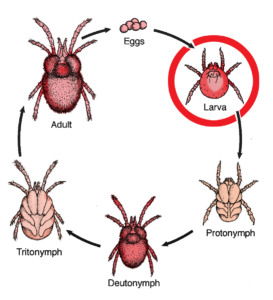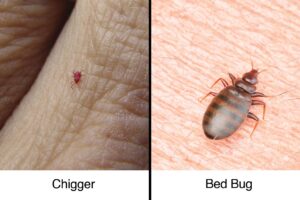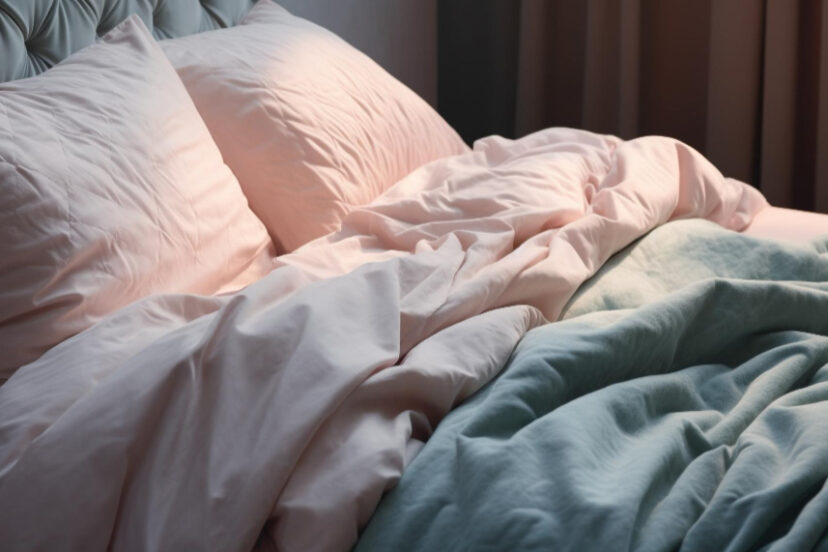Chiggers in Bed: Unwanted Bedroom Guests
Imagine settling into bed after a long day, only to wake up with itchy, red welts on your skin. The culprit? Possibly chiggers. These tiny mites can be a nuisance, especially when they find their way into our beds. In this guide “Chiggers in Bed”, we’ll explore everything you need to know about chiggers and how to prevent them from disrupting your peaceful slumber.
What are Chiggers?
Chiggers are minuscule arachnids that belong to the mite family. Often mistaken for insects, these tiny creatures are almost invisible to the naked eye, making them a stealthy nuisance. They thrive in various environments, especially in moist, grassy areas like meadows, parks, forests, and even our backyards. While they are prevalent in many parts of the world, they are especially active during the warmer months, making outdoor activities a prime time for potential chigger encounters.
Brief Description
Chiggers, scientifically known as Trombiculidae, are red-orange or straw-colored mites. At their larval stage, which is the only parasitic phase of their life cycle, they are barely noticeable at less than 1/150th of an inch in size. These larvae are equipped with specialized mouthparts that allow them to pierce the skin and feed on the host’s tissue, causing the characteristic itchy red bumps. Contrary to popular belief, chiggers do not burrow into the skin or suck blood. Instead, they inject enzymes that break down skin cells, which they then consume.
- Kills Bed Bugs and Fleas
- Inhibits Reinfestation Up to 7 Months
- Use indoors in enclosed spaces
- Non Toxic
- Kills Bed Bugs and Bed Bug Eggs
- Kills Fleas and Dust Mites
- Non-staining, Leaves No Odor
Lifecycle and Habits
The life cycle of chiggers consists of four main stages: egg, larva, nymph, and adult. The eggs are laid by adult females in the soil. Once hatched, the larvae seek out hosts, such as humans, pets, or wild animals, to feed on. After feeding for several days, the larvae drop off the host and transform into nymphs. Nymphs, which have eight legs (compared to the six-legged larvae), feed on plant material. After several molts, they mature into eight-legged adults. Interestingly, only the larval stage is parasitic and feeds on hosts; the nymph and adult stages are harmless to animals and humans.

Chiggers vs. Bed Bugs : The Differences
While both chiggers and bed bugs are notorious for their itchy bites, they are distinct creatures with different behaviors and characteristics. Chiggers are mites, while

How Chiggers End Up in Bed
Chiggers predominantly inhabit outdoor areas, particularly grassy or wooded environments. So, how do they end up in our cozy beds? The answer lies in their opportunistic nature. After spending time outdoors, especially in areas where chiggers are prevalent, these tiny mites can latch onto our clothes, shoes, or even our skin. Unknowingly, we might bring them into our homes. When we go to bed, they can transfer from our clothing or body to the sheets and mattress, leading to an unpleasant surprise the next morning.
Symptoms of Chigger Bites
Chigger bites are known for their intense discomfort, primarily caused by the enzymes they release into the skin, which break down host tissue for the chigger to feed on. The initial bite is often painless, but within hours, it can become intensely itchy, leading to red pimple-like bumps or hives. Scratching these bites can exacerbate the irritation and potentially cause secondary bacterial infections.
In addition to itching, the bite sites may develop blisters or pus-filled bumps, especially if they become infected. The redness and swelling can persist for several days, with itching lasting for over a week. It’s crucial to avoid scratching and to apply over-the-counter treatments like calamine lotion or hydrocortisone cream to alleviate symptoms. If the condition worsens or doesn’t improve within a week, seeking medical advice is recommended.
You might be interested in: Can Bed Bugs Bite Through Clothes?
Preventing Chiggers in Bed
Preventing chiggers from getting into your bed is the first line of defense against these pesky mites. One of the primary ways chiggers find their way into our homes is by hitching a ride on our clothing or skin after we’ve spent time outdoors. To minimize this risk, it’s advisable to change clothes and take a shower immediately after coming inside, especially if you’ve been in grassy or wooded areas. Washing the clothes you wore outside in hot water can also kill any chiggers that might be clinging to them.
Furthermore, it’s essential to be aware of your surroundings. If you’re in an area known for chiggers, try to avoid sitting or lying directly on the grass. Using repellents on your skin and clothing can also deter chiggers from latching onto you. Regularly cleaning and vacuuming your home, especially the bedroom, can help in reducing the chances of chiggers setting up residence in your living spaces.
- 100% Kill Efficacy Bedbugs, Mites, Eggs
- Lasting Protection
- USDA BIO-certified
- Plant Extract Based & Non-Toxic
- Child & Pet Safe
- Bedbug Detection and Protection
- Effective, Heav Duty, Versatile Design
- Use under bed posts and furniture legs
- Bed bugs climb in but cannot climb out
Cleanliness and Hygiene
Maintaining cleanliness and good hygiene is crucial in preventing chigger infestations. Regularly washing your bed linens in hot water ensures that any chiggers that might have found their way into your bed are eliminated. Vacuuming your mattress and the area around your bed can also help in removing chiggers and their eggs. It’s also beneficial to bathe or shower before bedtime, especially if you’ve been outdoors, to wash away any chiggers that might be on your skin.
In addition to personal hygiene, keeping your living spaces clean can deter chiggers. Regularly vacuuming carpets, rugs, and upholstered furniture can help in reducing chigger populations. Emptying the vacuum cleaner immediately after use ensures that the chiggers are disposed of and don’t find their way back into your home.
Protective Measures
When spending time outdoors, especially in areas known for chiggers, it’s essential to take protective measures. Wearing long pants and long-sleeved shirts can reduce the skin area exposed to chiggers. Tucking your pants into your socks can provide an added layer of protection. Using insect repellents, especially those containing DEET, can deter chiggers from latching onto you. It’s also advisable to avoid sitting or lying directly on the grass and to stay on trails when hiking to minimize contact with chiggers.
Treatment for Chigger Bites
If you’ve been bitten by chiggers, the first thing you’ll notice is the intense itching. It’s essential to resist the urge to scratch, as this can lead to secondary bacterial infections. Over-the-counter anti-itch creams or ointments containing hydrocortisone can help in reducing the itchiness. If the itching is severe, antihistamines can provide relief. Keeping the bite area clean and applying a mild antiseptic can prevent infections. If the bite area becomes increasingly red, swollen, or shows signs of infection, it’s crucial to seek medical attention.
How to Get Rid of Chiggers in Bed
If you suspect that chiggers have infested your bed, immediate action is required. Start by washing all your bed linens, including pillowcases, sheets, and blankets, in hot water. This will kill any chiggers present. Vacuuming your mattress thoroughly can help in removing chiggers and their eggs. Ensure that you empty the vacuum cleaner immediately after use. If the infestation is severe, you might consider using a mattress cover to encase the mattress, trapping the chiggers inside. Over time, without a food source, the chiggers will die. If the problem persists, consulting a pest control professional might be necessary.
- Wash All Bedding: Immediately wash sheets, pillowcases, blankets, and comforters in hot water. The heat will kill any chiggers present.
- Vacuum Thoroughly: Vacuum your mattress, bed frame, and the surrounding area. Make sure to dispose of the vacuum bag or empty the canister outside.
- Use Diatomaceous Earth: Sprinkle food-grade diatomaceous earth around the bed and on the mattress. This natural powder dehydrates and kills chiggers.
- Steam Clean: If you have a steam cleaner, use it on your mattress and bed frame. The high temperature will kill chiggers on contact.
- Apply Insect Repellent: Use an insect repellent specifically designed for chiggers on your bed. Make sure it’s safe for indoor use.
- Check and Clean Pets: If you have pets, ensure they aren’t bringing chiggers into your bed. Bathe them regularly and consider using a vet-approved repellent.
- Maintain a Clean Environment: Regular cleaning and decluttering can prevent chiggers and other pests from finding hiding spots in your bedroom.
- Consider Mattress Covers: Use a protective mattress cover that’s designed to keep out pests. This can prevent chiggers from getting into your mattress.
- Seek Professional Help: If the infestation is severe, consider hiring a pest control professional to treat your home for chiggers.
- Includes 12 peanut butter scented glue boards
- Bed Bugs, Spiders, Cockroaches, Mouse
- Great non-toxic way of catching rodents and insects
Summary: Staying Chigger-Free in Bed
Chiggers might be tiny, but they can cause a significant amount of discomfort. By understanding these mites and taking preventive measures, you can ensure a restful, itch-free night. Remember, it’s always better to be proactive than reactive when it comes to pests in your bed. Sleep tight, and don’t let the chiggers bite!
You might be interested in: The Royal Comfort of King Bedding
FAQs about Chiggers
Do chiggers live in beds long-term?
No, chiggers don’t infest beds like
How long do chigger bites last?
Chigger bites can last for 1-2 weeks, depending on the individual’s reaction and how well they manage the itching.
Can chiggers spread diseases?
In the U.S., chiggers don’t transmit diseases to humans. However, in some parts of the world, they can transmit a disease called scrub typhus.
How can I prevent chigger bites?
Using insect repellent, wearing protective clothing, and showering after being outdoors can help.
Are chigger bites dangerous?
While they’re not dangerous, they can be extremely itchy and uncomfortable. It’s essential to avoid scratching to prevent secondary infections.









